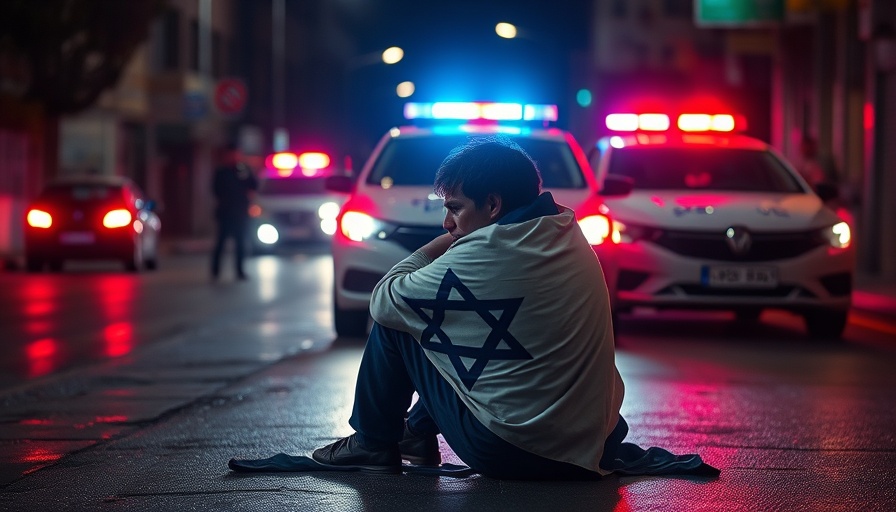
Tragic Shooting Claims Lives of Two Israeli Diplomats
On a night meant for celebration, tragedy struck outside the Capital Jewish Museum in Washington, D.C., as two Israeli Embassy staff members were shot and killed. This horrific incident unfolded on May 21, 2025, at approximately 9:08 p.m. local time, shortly after the victims exited the museum where they had attended an event.
The male victim was identified as an Israeli diplomat, while the female was an embassy employee. Witness accounts suggest that the shooting was a targeted attack, as the perpetrator, a 30-year-old man from Chicago, displayed premeditated behavior before ambushing the victims.
Events That Lead to the Attack
Reports indicate that the suspect was seen pacing outside the museum prior to the attack. After the shooting, he entered the museum and was apprehended by security personnel. He later admitted to the crime while in custody, even chanting "free, free Palestine," suggesting possible political motivations behind his actions.
This sheds light on the complexities of the current geopolitical climate, where attacks on foreign officials can often reflect broader tensions. The unsettling nature of this incident raises serious questions about the safety of diplomats and the potential for escalation in similar forms of violence.
Response and Investigation by Authorities
The shooting not only drew immediate attention from law enforcement but also highlighted the swift actions of the FBI, which has stated that there is no ongoing threat to public safety in the wake of the attack. The Metropolitan Police Department remains engaged in a thorough investigation to ascertain further details surrounding the motivation behind this tragic event.
U.S. Attorney General Pam Bondi and FBI Director Kash Patel have both reiterated their commitment to unraveling the circumstances behind this shooting, emphasizing the importance of international safety and security.
Reactions from the Community and Global Leaders
The attack has prompted strong reactions from government officials, including Secretary of Homeland Security Kristi Noem, who described the shooting as a senseless act. The Israeli embassy's spokesperson confirmed that other embassy staff members were injured during the assault, adding to the sense of urgency and distress within the diplomatic community.
Furthermore, prominent figures like Danny Danon, the Israeli ambassador to the United Nations, conveyed their condolences and outrage via social media, underlining the global ramifications of this attack. Such responses showcase the international solidarity against violence targeting diplomatic personnel.
Understanding the Implications of Targeted Violence
This violent incident serves as a grim reminder of the risks that come with diplomatic duties, especially in areas marked by political unrest. As tensions escalate in different corners of the world, diplomats increasingly find themselves in precarious situations. The international community must come together to reflect on how to better protect diplomats and reduce such violent encounters.
The shooting also underscores the broader issue of hate-fueled violence, which can affect numerous communities and individuals, especially those connected to volatile regions. Addressing these issues with compassion and understanding is crucial.
Seeking Solutions: Security Measures Moving Forward
In the aftermath of this tragic event, it is imperative to explore enhanced security protocols for embassies and diplomatic missions worldwide. Governments must invest in measures that can safeguard the lives of diplomats and ensure that they can perform their duties without fear.
Diplomatic efforts should also be intensified to address the root causes of violence through open dialogues, fostering understanding, and promoting peace. Only through proactive measures can we hope to ease the tensions that give rise to these tragic events.
Conclusion: A Call for Unity and Support
In light of the heartbreaking circumstances surrounding the shooting of two Israeli embassy staff members, it is vital for individuals and communities to unite in support of peace and reconciliation. Actively engaging in discussions about violence and understanding cultural differences can help pave the way for a more secure and harmonious future.
The lives lost in this tragic event remind us of the fragility of peace. As we learn from these instances, let us advocate for better protections for diplomats and emphasize collaborative efforts toward conflict resolution and mutual respect.
 Add Element
Add Element  Add Row
Add Row 



Write A Comment